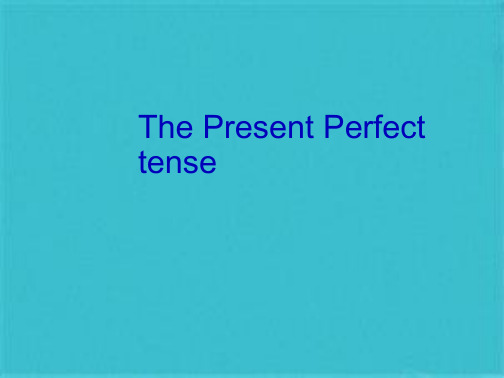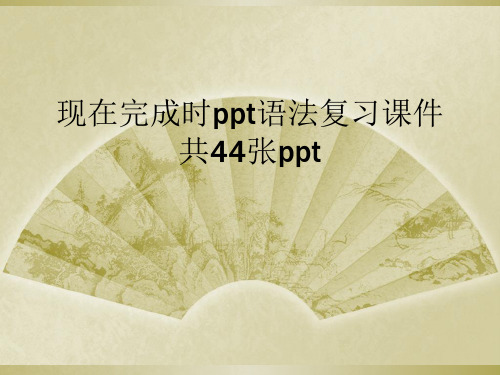现在完成时PPT
合集下载
中考英语复习:现在完成时课件 (共55张PPT)

Key words
yet
already
注意:already 用于肯定句,
yet 用于疑问句和否定句中
Has your brother ______ finished his A: ______ homework yet? (finish)
B: Yes, he ‘s already done it.
写出下列动词的过去式和过去分词:
visit visited repair repaired watch watched finish finished
move live love like
visited repaired watched finished
verb+ed
moved lived loved liked
never since
so far
到目前为止
have planted We _______ only ____________ 100 trees so far. (plant )
二、Adverbs of time(标志性的时间状语)
before(句末)(以前), 口诀 by now /so far(到目前为止), 以前从来不出现, once, twice, three times,… just(刚刚), 最近曾经一两遍, recently(最近), 自从刚刚for一段, yet(否/疑)(还/已经), already(肯)(已经), 目前已经很明显。 ever(否/疑)(曾经), never(从不), all one’s life(一生) , in /during the past /last 5 years(在过去的五年里), for + 一段时间
moved lived loved liked
初二人教英语现在完成时态课件(共25张PPT)

常见非延续性动词和延续性动词的转变
❖ arrive/come/go to be in
die
be dead
❖ become a
be a borrow
keep
❖ Leave/ move
be away / be out
❖ buy
have open
be open
❖ join
be in/a member of
5. --How many times _h_a_v_e____ you __r_e_a_d___ (read) this book?
❖ --I _h_a_v_e_r_e_a_d_ (read) it several times.
6. My brotherb_ou_g_h_t____ (buy) a car last month.
❖ The twins have joined the army. (since they are 18years old) The twins have been soldiers/ been in the army since they are 18years old.
-- When c_a_m_e_____ she _________ (come)? -- She ________ (come) just now.
I lived there 2 years ago
past
present
I have lived here for two years
❖ 1.都表示过去发生的事 ❖ 2.现在完成时强调过去和现在的联系,不能和具
定回答) He has already finished a story book.
4.He finished reading a story- book. (改成现在完成时)
现在完成时讲解(完整版)(共17张PPT)

3. My sister has had her cell phone _____fo_ra month .
4. My friends haven’t visited me ___s_in_c_efew days ago.
5. We haven’t used our car _____faorlong time .
I have planted all the trees. 注:主语假设是第三人称单数助动词用 has
finished 9. goes 10. have, found 11. is He’ll be back soon.
Where’s Li Ming ? He __________ (go) to the teacher’s office.
否认形式 haven’t ( have not 〕 +过去分词 I ________ (see) it last week.
Where’s Li Ming ? He __________ (go) to the teacher’s office.
hasn’t ( has not ) +过去分词 have, stayed 8.
have, finished
have, stayed
• 1. have, seen, saw 2. Has, finished 3. has, —Yes, I ___________ New York twice.
You have planted all the trees. since: (自…以来)
6. She hasn’t had a good cup of coffee _____yefaorrs.
7. Tom has worn glasses _______he was 7 years old. since
4. My friends haven’t visited me ___s_in_c_efew days ago.
5. We haven’t used our car _____faorlong time .
I have planted all the trees. 注:主语假设是第三人称单数助动词用 has
finished 9. goes 10. have, found 11. is He’ll be back soon.
Where’s Li Ming ? He __________ (go) to the teacher’s office.
否认形式 haven’t ( have not 〕 +过去分词 I ________ (see) it last week.
Where’s Li Ming ? He __________ (go) to the teacher’s office.
hasn’t ( has not ) +过去分词 have, stayed 8.
have, finished
have, stayed
• 1. have, seen, saw 2. Has, finished 3. has, —Yes, I ___________ New York twice.
You have planted all the trees. since: (自…以来)
6. She hasn’t had a good cup of coffee _____yefaorrs.
7. Tom has worn glasses _______he was 7 years old. since
现在完成时(23张PPT)

用法
现
在
构成
完
成
标志词
时
重难点
情境导入
Hello, Ken! Have you just been to the cinema?
Hi, George! Yes, I have.
一、用法
现在完成时的两种主要用法
moved here had20b1r5eakfast
I’mI sntoiltl hliuvne ghreyrenow
have __n_e_v_e_r_______ seen it.”
5. “Has the bus left _y_e_t_________?” “Yes, it has
______a_lr_e_a_d_y___ left.”
三、标志词
2. since 和for 的区别
注:since 和for 的区别 • since后+时间点,如:2001,yesterday,
三、标志词 play basketball; for 3 years A: How longh_a_v_e__ you p_l_a_y_e_d_b_a_s_k_e_t_b_a_l_l ? B: Ih_a_v_e_p__la_y_e_d_ it_fo_r__3_y_e_a_r_s__. use this book; since 2017 A: How long _h_a_s_ Bill _u_s_e_d__th_i_s_b_o_o_k_ ? B: He _h_a_s__u_s_ed_ it _s_in_c_e__2_0_1_7_. know your best friend; since last year A: How long __h_a_v_e you k_n_o_w__n_y_o_u__r_b_e_s_t_f_riend__ ? B: I _h_a_v_e_k__n_o_w_n_ her/him _s_in_c_e__la_s_t_y_e_a_r_.
现
在
构成
完
成
标志词
时
重难点
情境导入
Hello, Ken! Have you just been to the cinema?
Hi, George! Yes, I have.
一、用法
现在完成时的两种主要用法
moved here had20b1r5eakfast
I’mI sntoiltl hliuvne ghreyrenow
have __n_e_v_e_r_______ seen it.”
5. “Has the bus left _y_e_t_________?” “Yes, it has
______a_lr_e_a_d_y___ left.”
三、标志词
2. since 和for 的区别
注:since 和for 的区别 • since后+时间点,如:2001,yesterday,
三、标志词 play basketball; for 3 years A: How longh_a_v_e__ you p_l_a_y_e_d_b_a_s_k_e_t_b_a_l_l ? B: Ih_a_v_e_p__la_y_e_d_ it_fo_r__3_y_e_a_r_s__. use this book; since 2017 A: How long _h_a_s_ Bill _u_s_e_d__th_i_s_b_o_o_k_ ? B: He _h_a_s__u_s_ed_ it _s_in_c_e__2_0_1_7_. know your best friend; since last year A: How long __h_a_v_e you k_n_o_w__n_y_o_u__r_b_e_s_t_f_riend__ ? B: I _h_a_v_e_k__n_o_w_n_ her/him _s_in_c_e__la_s_t_y_e_a_r_.
现在完成时ppt课件

结构不同
过去完成时由“had+过去分词”构成,而现在完成时由 “have/has+过去分词”构成。
动作的完成情况不同
过去完成时表示动作在过去某一时间之前已经完成,而现在完成时 则表示动作在过去发生后对现在造成了影响或结果。
PART 05
现在完成时的常见错误
REPORTING
忽略现在完成时的使用场合
PART 03
现在完成时的特殊用法
REPORTING
与already连用的用法
总结词
already是现在完成时的常用副词之一,用于表达某件事情已经完成或已经发 生。
详细描述
在现在完成时中,already通常用于肯定句中,表示某件事情已经完成或已经发 生,常与have或has连用。例如,“I have already finished my homework.”(我已经完成了我的作业)。
总结词
不重视现在完成时的应用场景
详细描述
有些英语学习者在运用现在完成时的时候, 不注意它所适用的场合。现在完成时主要用 来描述过去发生的动作或状态对现在造成的 影响或结果,比如:“I have finished my homework”(我已经完成了我的作业)。
混淆现在完成时与一般过去时的使用场合
现在完成时ppt课件
REPORTING
• 现在完成时的定义和构成 • 现在完成时的基本用法 • 现在完成时的特殊用法 • 现在完成时与一般过去时的区别 • 现在完成时的常见错误 • 现在完成时练习题及答案解析
目录
PART 01
现在完成时的定义和构成
REPORTING
现在完成时的定义
现在完成时是英语语法中的一种时态 ,通常由助动词have/has + 过去分 词构成,用于描述过去发生的动作或 状态对现在产生的影响或结果。
过去完成时由“had+过去分词”构成,而现在完成时由 “have/has+过去分词”构成。
动作的完成情况不同
过去完成时表示动作在过去某一时间之前已经完成,而现在完成时 则表示动作在过去发生后对现在造成了影响或结果。
PART 05
现在完成时的常见错误
REPORTING
忽略现在完成时的使用场合
PART 03
现在完成时的特殊用法
REPORTING
与already连用的用法
总结词
already是现在完成时的常用副词之一,用于表达某件事情已经完成或已经发 生。
详细描述
在现在完成时中,already通常用于肯定句中,表示某件事情已经完成或已经发 生,常与have或has连用。例如,“I have already finished my homework.”(我已经完成了我的作业)。
总结词
不重视现在完成时的应用场景
详细描述
有些英语学习者在运用现在完成时的时候, 不注意它所适用的场合。现在完成时主要用 来描述过去发生的动作或状态对现在造成的 影响或结果,比如:“I have finished my homework”(我已经完成了我的作业)。
混淆现在完成时与一般过去时的使用场合
现在完成时ppt课件
REPORTING
• 现在完成时的定义和构成 • 现在完成时的基本用法 • 现在完成时的特殊用法 • 现在完成时与一般过去时的区别 • 现在完成时的常见错误 • 现在完成时练习题及答案解析
目录
PART 01
现在完成时的定义和构成
REPORTING
现在完成时的定义
现在完成时是英语语法中的一种时态 ,通常由助动词have/has + 过去分 词构成,用于描述过去发生的动作或 状态对现在产生的影响或结果。
《现在完成时态》ppt课件

REPORT
现在完成时态
CATALOG
DATE
ANALYSIS
SUMMARY
目录
CONTENTS
• 现在完成时态的定义 • 现在完成时态的用法 • 现在完成时态与一般过去时的区别 • 现在完成时态的特殊用法 • 现在完成时态的练习与解析
REPORT
CATALOG
DATE
ANALYSIS
SUMMAR Y
翻译练习
总结词
跨文化理解
总结词
句型转换能力
详细描述
通过将英文句子翻译成中文,学生可以更 好地理解现在完成时态在中文表达中的对 应形式,促进跨文化交流和理解。
详细描述
翻译练习不仅要求学生掌握时态的转换, 还需要注意句型的变化和语言的流畅性, 有助于提高学生的语言运用能力。
REPORT
THANKS
感谢观看
用于描述过去发生的某个事件或经历, 并强调该事件或经历对现在的影响或 结果。
用于表达对过去某个时间点或时期的 情况的回忆或回顾。
REPORT
CATALOG
DATE
ANALYSIS
SUMMAR Y
03
现在完成时态与一般过 去时的区别
时间点的区别
01
过去时描述过去某个时间点发生 的事情,强调事情发生的时间点 。
CATALOG
DATE
ANALYSIS
SUMMAR Y
这个句子中的“Have you seen” 表示询问对方是否已经完成了动 作“看电影”,强调了动作的完
成状态。
REPORT
CATALOG
DATE
ANALYSIS
ቤተ መጻሕፍቲ ባይዱ
SUMMAR Y
05
现在完成时态
CATALOG
DATE
ANALYSIS
SUMMARY
目录
CONTENTS
• 现在完成时态的定义 • 现在完成时态的用法 • 现在完成时态与一般过去时的区别 • 现在完成时态的特殊用法 • 现在完成时态的练习与解析
REPORT
CATALOG
DATE
ANALYSIS
SUMMAR Y
翻译练习
总结词
跨文化理解
总结词
句型转换能力
详细描述
通过将英文句子翻译成中文,学生可以更 好地理解现在完成时态在中文表达中的对 应形式,促进跨文化交流和理解。
详细描述
翻译练习不仅要求学生掌握时态的转换, 还需要注意句型的变化和语言的流畅性, 有助于提高学生的语言运用能力。
REPORT
THANKS
感谢观看
用于描述过去发生的某个事件或经历, 并强调该事件或经历对现在的影响或 结果。
用于表达对过去某个时间点或时期的 情况的回忆或回顾。
REPORT
CATALOG
DATE
ANALYSIS
SUMMAR Y
03
现在完成时态与一般过 去时的区别
时间点的区别
01
过去时描述过去某个时间点发生 的事情,强调事情发生的时间点 。
CATALOG
DATE
ANALYSIS
SUMMAR Y
这个句子中的“Have you seen” 表示询问对方是否已经完成了动 作“看电影”,强调了动作的完
成状态。
REPORT
CATALOG
DATE
ANALYSIS
ቤተ መጻሕፍቲ ባይዱ
SUMMAR Y
05
现在完成时ppt课件

详细描述
例如,“他昨天正在巴黎旅行”是过去进行时,强调昨天正在进行的动作,而“ 他已经去了巴黎”是现在完成时,强调现在已完成去巴黎的动作及其对现在的影 响。
05 现在完成时的常见错误
混淆现在完成时和一般现在时
总结词
混淆现在完成时和一般现在时是常见的语法错误之一。
详细描述
现在完成时表示过去发生的动作对现在造成的影响或结果,而一般现在时则表示通常或反复发生的动作。两者的 区别在于现在完成时涉及时间上的“过去-现在”联系。
详细描述:现在完成时是英语语法中的一种时态,表示 过去发生的动作对现在造成的影响或结果。以下是现在 完成时的基本用法练习题
2. They have ______ a race.
3. She has ______ a headache.
答案: 1. written 2. run 3. had
现在完成时的特殊用法练习题
有些动词的过去分词形式是 不规则的,需要单独记忆, 例如go变成gone,write变 成written等。
02 现在完成时的基本用法
肯定句的用法
总结词
现在完成时在肯定句中通常用来表示动作在 过去已经完成,但对现在仍有影响。
详细描述
使用现在完成时,我们能够表达一个动作或 状态在过去已经发生或存在,但这个动作或
总结词:现在完成时的特殊用法练习 题
01
详细描述:除了基本用法外,现在完 成时还有许多特殊用法。以下是现在
完成时的特殊用法练习题
02
1. We have ______ in this school for three years.
03
Hale Waihona Puke 06答案: 1. been 2. bought 3. gone
例如,“他昨天正在巴黎旅行”是过去进行时,强调昨天正在进行的动作,而“ 他已经去了巴黎”是现在完成时,强调现在已完成去巴黎的动作及其对现在的影 响。
05 现在完成时的常见错误
混淆现在完成时和一般现在时
总结词
混淆现在完成时和一般现在时是常见的语法错误之一。
详细描述
现在完成时表示过去发生的动作对现在造成的影响或结果,而一般现在时则表示通常或反复发生的动作。两者的 区别在于现在完成时涉及时间上的“过去-现在”联系。
详细描述:现在完成时是英语语法中的一种时态,表示 过去发生的动作对现在造成的影响或结果。以下是现在 完成时的基本用法练习题
2. They have ______ a race.
3. She has ______ a headache.
答案: 1. written 2. run 3. had
现在完成时的特殊用法练习题
有些动词的过去分词形式是 不规则的,需要单独记忆, 例如go变成gone,write变 成written等。
02 现在完成时的基本用法
肯定句的用法
总结词
现在完成时在肯定句中通常用来表示动作在 过去已经完成,但对现在仍有影响。
详细描述
使用现在完成时,我们能够表达一个动作或 状态在过去已经发生或存在,但这个动作或
总结词:现在完成时的特殊用法练习 题
01
详细描述:除了基本用法外,现在完 成时还有许多特殊用法。以下是现在
完成时的特殊用法练习题
02
1. We have ______ in this school for three years.
03
Hale Waihona Puke 06答案: 1. been 2. bought 3. gone
现在完成时(16张PPT)初中英语专项复习课件

考查现在完成时标志词。题1中,15 days为时间段, 选用for。题2、3中, 7 o’clock和1974为时间点,选 用since。
【典例2】My parents ________Nanjing twice.
A. have gone to B. have been to
C. have been in
易错点1 现在完成时常见标志词辨析
ever用于疑问句,意为“曾经”,位于句中 Have you ever eaten fish?
never含否定意义,意为“从不”,位于句中 I have never eaten fish.
易错点1 现在完成时常见标志词辨析
just多用于肯定句, 意为“刚刚”,位于句中 I have just had my lunch.
B. yet
C. ever
D. still
考查现在完成时标志词。句意:他曾去过上海吗? 由题目可知为现在完成时。根据句意“曾经”, 选用ever。
【典例5】Have you met Mr Li ______?
A. just
B. ago
C. before D. a moment ago
考查现在完成时标志词。句意:你以前见过李先生 吗?ago用于一般过去时,just用于句中,答案只能 选C。
before用于所有句式, 意为“……之前”,位于句末
She hasn’t seen you before.
易错点2 since/for用法辨析
since
since+时间点 He has lived in China since 1992.
since+ 时间段+ ago John has been a football player since 3 years ago.
【典例2】My parents ________Nanjing twice.
A. have gone to B. have been to
C. have been in
易错点1 现在完成时常见标志词辨析
ever用于疑问句,意为“曾经”,位于句中 Have you ever eaten fish?
never含否定意义,意为“从不”,位于句中 I have never eaten fish.
易错点1 现在完成时常见标志词辨析
just多用于肯定句, 意为“刚刚”,位于句中 I have just had my lunch.
B. yet
C. ever
D. still
考查现在完成时标志词。句意:他曾去过上海吗? 由题目可知为现在完成时。根据句意“曾经”, 选用ever。
【典例5】Have you met Mr Li ______?
A. just
B. ago
C. before D. a moment ago
考查现在完成时标志词。句意:你以前见过李先生 吗?ago用于一般过去时,just用于句中,答案只能 选C。
before用于所有句式, 意为“……之前”,位于句末
She hasn’t seen you before.
易错点2 since/for用法辨析
since
since+时间点 He has lived in China since 1992.
since+ 时间段+ ago John has been a football player since 3 years ago.
初中英语现在完成时讲解全(共24张PPT)

I studied English ten years ago.
(come来到某地….
left the team
has been on C.
表示动作发生在过去,对现在造成的影响。
)
be over
went to bed
填空使用for和since
Tom ___for several hours.
表示动作发生在过去,对现在造成的影响。
• She has lived here ______1996.
• 2 标准词:so far/up to now (到目前为止) ;lately/recently(最近)
• Up to now/So far ,I haven’t been successful.
• Lately/Recently,I haven’t seen my teacher.
3. He bought the motorbike a month ago.
---He ____ ____ the motorbike for a month. 4. He arrived here three days ago.
--- He ____ ____ here since three days ago. 5. They turned off the light 2 hours ago.
(finish结束....)
be over
1.我买这本书三年了。Buy I have bought the book.
(1) I have had the book for 3 years. (2) I have had the book since 3 years ago.
了borrow He has borrow the book. (1)He has kept the book for 2 months . (2) He has kept the book since 2 months ago.
现在完成时完整版本ppt课件

4.Mr Green has worked here _s_in_c_e__ he came to China.
5.His grandpa has been dead __f_o_r__ several years.
.
14
严格执行突发事件上报制度、校外活 动报批 制度等 相关规 章制度 。做到 及时发 现、制 止、汇 报并处 理各类 违纪行 为或突 发事件 。
yet. 3.We __h_a_v_e_ never __s_e_en__ (see) this book
before.
5.Mother __h_a_s_ just _c_le_a_n_e_d_(clean) the house.
6.Sally _h_a_s__vi_s_it_e_d_(visit) China before.
.
18
严格执行突发事件上报制度、校外活 动报批 制度等 相关规 章制度 。做到 及时发 现、制 止、汇 报并处 理各类 违纪行 为或突 发事件 。
举例:
1.我买了这本书五年了。 I have bought this book for five years. ( F ) I have had this book for five years. ( T ) 2.这位老人已经死了十年了。 The old man has died for ten years. ( F ) The old man has been dead for ten years. ( T )
3. He hasn’t returned (not return) the book yet. 三、判断正误:(2分,每题1分)
1.他爷爷已经去世三年了。
His grandpa has died for 3 years.( F) 2. 他去过北京。
现在完成时ppt语法复习课件共44张ppt

Yes, I have done that already. ⑤ I’ve just finished my homework. ⑥ He has not come yet.
Exercises
• 1. I _h_a_v_e__h_a_d (have) lunch already. • 2. Has the train_a_r_r_i_v_e_d(arrive) yet? • 3.Tom _h_a_s_ never__b_e_e_n__ (be ) to China. • 4. The twin ___h_a_s_justs_e_e_n__(see) my father. • 5. The twins _s_a_w_(see) my father just now. • 6._h_a_v_e__ you ever _ri_d_d_e_n__(ride) a horse? Never.
通常与表示包括现在在内的时间副词 just (谓语动词之前) (刚 刚), already(已经(肯定句) ), before, yet(一般疑问(句 末) :已经;否定句:还) never, ever (疑问句) twice recently(近来)等状语连用
① I have never heard of that before. ② Have you ever ridden a horse? ③ She has already finished the work. ④ Have you milked the cow yet?
8._H_a__s__ he __se__e_n_(see) this film yet? No. When w__il_l __ he __se_e__(see) it? He w__il_l_s_e_eit tomorrow.
Exercises
• 1. I _h_a_v_e__h_a_d (have) lunch already. • 2. Has the train_a_r_r_i_v_e_d(arrive) yet? • 3.Tom _h_a_s_ never__b_e_e_n__ (be ) to China. • 4. The twin ___h_a_s_justs_e_e_n__(see) my father. • 5. The twins _s_a_w_(see) my father just now. • 6._h_a_v_e__ you ever _ri_d_d_e_n__(ride) a horse? Never.
通常与表示包括现在在内的时间副词 just (谓语动词之前) (刚 刚), already(已经(肯定句) ), before, yet(一般疑问(句 末) :已经;否定句:还) never, ever (疑问句) twice recently(近来)等状语连用
① I have never heard of that before. ② Have you ever ridden a horse? ③ She has already finished the work. ④ Have you milked the cow yet?
8._H_a__s__ he __se__e_n_(see) this film yet? No. When w__il_l __ he __se_e__(see) it? He w__il_l_s_e_eit tomorrow.
初中语法——现在完成时-课件(共75张PPT)

1、规则变化(过去分词与过去时变化规则一样)
(1)、一般动词,在词尾直接加“ ed ”。 work---worked---worked visit---visited---visited
(2)、以“ e ”结尾的动词,只在词尾加 “ d ”。
live---lived
(3)、以“辅音字母 + y ”结尾的动词,将 “y” 变为 “i”,
3.The film has been on __f_o_r__ 20 minutes. 4.Mr Green has worked here _s_in_c_e__ he came to China.
5.His grandpa has been dead __fo__r __ several years.
肯定句: “己经”
I’ve already had breakfast. (常见) = I’ve had breakfast already.
一般疑问句: 句末(表示惊讶的语气) “难道”
Have you had breakfast already? (表示强调)
(2) yet
否定句:句末 “还(没)” I haven’t had breakfast yet.
You have planted all the trees. I have planted all the trees. He/she has planted all the trees. They have planted all the trees.
主语若是第三人称单数助动词用 has
过去分词
12. Tom has worn glasses _s_i_n_ce___he was 7 years old.
borrow arrive/come
(1)、一般动词,在词尾直接加“ ed ”。 work---worked---worked visit---visited---visited
(2)、以“ e ”结尾的动词,只在词尾加 “ d ”。
live---lived
(3)、以“辅音字母 + y ”结尾的动词,将 “y” 变为 “i”,
3.The film has been on __f_o_r__ 20 minutes. 4.Mr Green has worked here _s_in_c_e__ he came to China.
5.His grandpa has been dead __fo__r __ several years.
肯定句: “己经”
I’ve already had breakfast. (常见) = I’ve had breakfast already.
一般疑问句: 句末(表示惊讶的语气) “难道”
Have you had breakfast already? (表示强调)
(2) yet
否定句:句末 “还(没)” I haven’t had breakfast yet.
You have planted all the trees. I have planted all the trees. He/she has planted all the trees. They have planted all the trees.
主语若是第三人称单数助动词用 has
过去分词
12. Tom has worn glasses _s_i_n_ce___he was 7 years old.
borrow arrive/come
初中英语语法现在完成时精讲PPT

• 2. We went to the USA last Monday. Today is Monday . We h_a_v_e_s_t_a_y_ed_ (stay) in the USA since last Monday.
since and for
The woman has worked at this school for 2 years.( since two years ago)
4. 现在完成时常常与表示频度的时间状语 连用,如often, sometimes, ever, never, twice, on several occasion等:
Have you ever been to Beijing? I have never heard of Bunny. I have used this pen only three times. George has met that gentleman on several occasions.
__f_o_r __two days
__s_in_c_e__1997
__si_n_ce__yesterday
__fo_r___two weeks
afternoon
___s_in_c_e _three years
__si_n_ce__I came here ago
__si_n_ce__last Sunday __s_in_c_e__ last month
for + 时间段 for 2 years/a long time
since+时间点 since 2 years ago
since 1998 since she came to the school)
一、用for和since填空。
since and for
The woman has worked at this school for 2 years.( since two years ago)
4. 现在完成时常常与表示频度的时间状语 连用,如often, sometimes, ever, never, twice, on several occasion等:
Have you ever been to Beijing? I have never heard of Bunny. I have used this pen only three times. George has met that gentleman on several occasions.
__f_o_r __two days
__s_in_c_e__1997
__si_n_ce__yesterday
__fo_r___two weeks
afternoon
___s_in_c_e _three years
__si_n_ce__I came here ago
__si_n_ce__last Sunday __s_in_c_e__ last month
for + 时间段 for 2 years/a long time
since+时间点 since 2 years ago
since 1998 since she came to the school)
一、用for和since填空。
现在完成时课件(图片版)(共59张PPT)

•
ห้องสมุดไป่ตู้
15、最具挑战性的挑战莫过于提升自 我。。2 021年8 月下午 10时56 分21.8. 722:56 August 7, 2021
•
16、业余生活要有意义,不要越轨。2 021年8 月7日 星期六1 0时56 分40秒2 2:56:40 7 August 2021
•
17、一个人即使已登上顶峰,也仍要 自强不 息。下 午10时5 6分40 秒下午1 0时56 分22:56: 4021.8. 7
过去分词的构成方式
一 现在完成时的结构
•have/has+过去分词
二 现在完成时的用法
•
9、有时候读书是一种巧妙地避开思考 的方法 。21.8. 721.8.7 Saturday, August 07, 2021
谢谢观赏
You made my day!
我们,还在路上……
•
10、阅读一切好书如同和过去最杰出 的人谈 话。22: 56:4022 :56:402 2:568/ 7/2021 10:56:40 PM
•
11、越是没有本领的就越加自命不凡 。21.8.7 22:56:4 022:56 Aug-21 7-Aug-2 1
•
12、越是无能的人,越喜欢挑剔别人 的错儿 。22:56: 4022:5 6:4022: 56Satur day, August 07, 2021
•
13、知人者智,自知者明。胜人者有 力,自 胜者强 。21.8.7 21.8.72 2:56:40 22:56:4 0Augus t 7, 2021
•
14、意志坚强的人能把世界放在手中 像泥块 一样任 意揉捏 。2021 年8月7 日星期 六下午1 0时56 分40秒2 2:56:40 21.8.7
现在完成时的课件PPT

肯定句表达注意事项
01
注意区分现在完成时与一般过去时的用法,现在完成时 强调过去发生的动作对现在的影响,而一般过去时只表 示过去的某个动作或状态。
02
注意have/has的变形,当主语为第三人称单数时, have要变为has。
03
过去分词的变化规则需要掌握,包括规则变化和不规则 变化。
03 现在完成时否定句式
针对性辅导
拓展延伸
根据学生的实际情况,教师进行拓展 延伸,提供更多相关知识和练习题目 ,帮助学生进一步提高现在完成时的 运用能力。
针对学生在练习中暴露出的问题,教 师进行针对性辅导,帮助学生解决问 题。
1.谢谢聆 听
肯定句
主语 + have/has + 过 去分词 + 其他成分。
否定句
主语 + have/has + not + 过去分词 + 其 他成分。
疑问句
Have/Has + 主语 + 过去分词 + 其他成分 ?
简略回答
Yes, 主语 + have/has. 或 No, 主语 + haven't/hasn't.
否定句表达注意事项
注意区分现在完成时与一般过去时
现在完成时强调过去发生的动作对现在造成的影响或结果,而一般过去时只表示过去某个时间发生的 动作或存在的状态。
注意have/has的否定缩写形式
have not=haven't,has not=hasn't。
现在完成时疑问句式和回答方
04
式
疑问句构成及用法
特点
具有现在相关的时间参照点,强 调过去动作与现在的联系。
- 1、下载文档前请自行甄别文档内容的完整性,平台不提供额外的编辑、内容补充、找答案等附加服务。
- 2、"仅部分预览"的文档,不可在线预览部分如存在完整性等问题,可反馈申请退款(可完整预览的文档不适用该条件!)。
- 3、如文档侵犯您的权益,请联系客服反馈,我们会尽快为您处理(人工客服工作时间:9:00-18:30)。
• 1. Have you ever seen him
before? • 2. We have ever been to Hainan many times. • 3. I have never seen you before.
3.常与for或since连用。For后接 一段时间;since 后接过去的点 时间或表示过去时间的时间状语 从句。
1.We have already known each other. • 2. I have just washed my face. • 3. I haven’t read your novel yet. yet.
•
2 .表示从过去到现在曾经发生过或经 .表示从过去到现在曾经发生过或经 历过某事,表达一种经验或经历, 历过某事,表达一种经验或经历,常 与副词ever, 与副词ever, never, once, twice, before等连用 before等连用
现在完成时
现在完成时表示过去的动作或存在的状对现在造成的影 响或结果,过去的这个动作或状态也有可能持续下去。 响或结果,过去的这个动作或状态也有可能持续下去。
• 1.I have just done my homework. • 2.Who has taken my pen? • 3.He has lived here since 1992. • 4.The bus has just left. left. • 5.They have seen the film
• ( C ) 1. Neither you nor Lily ___ to the
Great Wall. • A. have gone B. has went C. has been D. have been • ( C ) 2. Where ___ you _____yesterday? • A. have… been B. have …gone C. have… did…go D. were…gone did… were… • (C ) 3. Mr Black ____ here for three years since he came to China. • A. works B. worked C. has worked D. had worked
• 2. have (has) gone to表示 to表示
“某人去某地了”说明那个人 某人去某地了” 不在说话处, 不在说话处,其主语常用第三 人称。 人称。 • I didn’t see your father. Where is he? • He has gone to Australia.
现在完成时专练
• ( D ) 4. ____ for two months. • A. The meeting has begun • B. His father has bought the car • C. My brother has become a doctor
D. She has worked here • ( C ) 5. A: ____ Jim ____ to England? • B: Yes, he’ll be back next week. he’ • A. Does, go B. Has, been • C. Has, gone D. did, go
1. It is a long time since they saw each other last. 2. How long is it since you took part in the organization? 3.It has been 3 years since I lived here. 4.It will be 8 years next month since I became a teacher.
( D )10. The meeting __for five minutes. A. has begun B. had begun C. had been on D. has been on • 填空 have 1. The Greens __ been (be) here since two year ago. 2. I won’t go to see the film tonight, won’ because I ______ my ticket. (lose) have lost
三.现在完成时的用法:
1.表示一个动作刚刚结束或完成,但这个动作所 1.表示一个动作刚刚结束或完成 表示一个动作刚刚结束或完成, 造成的状态或影响依然存在, 造成的状态或影响依然存在,即表示过去的动作对 现在的影响或结果,强调现在的情况, 现在的影响或结果,强调现在的情况,常与副词 just, already, yet 连用。(注意:already多用 连用。(注意:already多用 。(注意 于肯定句或疑问句中,yet常用于疑问句或否定句 于肯定句或疑问句中,yet常用于疑问句或否定句 句尾。) 句尾。)
B: “She ____ to the library just now.” now.” A. goes B. went C. has gone D. is going
this?
• ( D ) 8. A: Who’s done best in the history Who’
exam this week? • B: Lily _____. • A. is B. does C. was D. has • ( B ) 9. I can’t open the door because I ____ can’ my keys. • A. lost B. have lost C. will lose
already.
一.现在完成时的构成
“主语+助动词have / has + 动词过去分 主语+助动词have 当主语是第三人称单数形式时, 词”。当主语是第三人称单数形式时,要 用助动词has,其他形式主语时用助动词 用助动词has,其他形式主语时用助动词 have
1.I have had lunch already. 2.She has bought some books 3.The building has been built for three years
• They began to cook two minutes • • • •
ago. (同义句) (同义句) have cooked They _____ _____ for two minutes *The bookshop closed half an hour ago. has been closed The bookshop _____ ______ _______ for half an hour. have ______ ______ 5. They ______been married (marry) for 2 years.
2.点(瞬间)动词或非延续性动 2.点 瞬间) 词:
• buy, borrow, leave, join, die,
arrive, come, go, begin, start, get, become, lose等,它们不能 lose等 和表示一段时间的时间状语连用。 和表示一段时间的时间状语连用。 如: • for +一段时间,since引导的表示 +一段时间 since引导的表示 一段时间, 一段时间的时间状语
• 3.与ever, never,just, always等表 3.与 always等表
示不确定的时间副词连用时,可用现在 示不确定的时间副词连用时,可用现在 时间副词连用时 完成时也可用一般过去时。 也可用一般过去时 完成时也可用一般过去时。 Have you ever heard of such a 现在完成时。) man? (现在完成时。) Did you ever hear of such a man? (一般过去时。) 一般过去时。) • 4.终止动词的否定式可与for或since 4.终止动词的否定式可与 或 终止动词的否定式可与for 引导的表示一段时间的副词短语 副词短语或 引导的表示一段时间的副词短语或状 语从句连用 连用。 语从句连用。 I haven't seen her for five years.
• buy--have / borrow---keep/ become— buy--have borrow---keep/ become—
be /die—bedead /marry----be married/ /die— /marry----be start(begin)---be start(begin)---be on/ end (finish)----be (finish)----be over/ join------ be in/ join-----• arrive(reach, get to,)---be in/ leave--to,)---be leave--be off (away)/ away)
用延续性动词或状态动词代替非续 性动词。 \\\\\\\\\\\\\\\\\\\\\\\\\\\\\\\\\\\\\
• 1.I have kept the book for a month. month. • 2. She has had the bike for over a
year.
(误)He has arrived here for three days. (正)He has been here for three days.
1. It hasn’t rained since two months ago. 2. He has been in Beijing for over ten years. 3. How many words have you learned since you came here?
